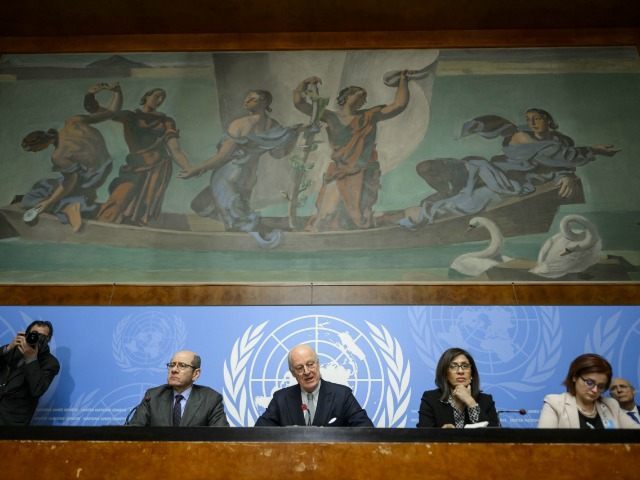Syrian peace talks brokered by the United Nations were scheduled to begin on Monday, but opposition groups indicated that they would only attend if the Bashar al-Assad regime and its Russian allies stop bombing their territory and lift sieges on towns that are being starved.
As a result, the Syrian peace talks are now expected to begin Friday.
“The first talks in two years to end the Syrian civil war were meant to begin on Monday but have been held up in part by a dispute over who should represent the opposition to President Bashar al-Assad,” reports Reuters.
On Monday, UN envoy Staffan de Mistura told reporters in Geneva that he was still working on his list, adding that he expected to issue the invitations on Tuesday for talks to begin Friday.
“The aim would be six months of talks, first seeking a ceasefire, later working toward a political settlement to a war that has killed more than 250,000 people, driven more than 10 million from their homes and drawn in global powers,” notes Reuters.
De Mistura is quoted by Reuters as telling reporters that except for territory controlled by the Islamic State (ISIS/ISIL) and al-Qaeda’s Syrian offshoot the Nusra Front, the ceasefire would cover the entire country.
The UN envoy acknowledged that the efforts to end the nearly five-year old war would face difficulties.
“In terms of vision, things may get faster, things may get slower, I can tell you in advance, don’t be surprised,” de Mistura told reporters.
“There will be a lot of posturing, we know that, a lot of walk-outs and walk-ins because a bomb has fallen or because someone has done an attack, and you will see that happening,” he also said, stressing, “We should not be impressed, neither depressed, but it’s likely to happen. The important thing is that we keep the momentum.”
The Assad regime representatives and opposition delegations would sit in separate rooms, with UN officials shuttling between them.
In a press release, the UN notes, “The talks stem from an agreement reached in Vienna in November by the International Syria Support Group (ISSG), comprising the Arab League, the European Union, the United Nations, and 17 countries including the United States and Russia, as part of an effort to end the five-year-long war with an agreement on new governance, a new constitution and new elections.”
De Mistura’s two predecessors quit in apparent frustration after holding peace negotiations of their own that failed.
“There are political risks,” said the envoy. “But those political risks, and tensions and positioning and prepositioning should be also taking into account that our line is, and the Security Council has been clear, no pre-conditions at least to start it off and while the talks start.”
Reuters quoted a spokesman for one of Syrian rebel groups in the opposition High Negotiating Committee (HNC) as saying that the opposition would stay away if rebel territory continues to be pounded by airstrikes and besieged towns continue to be starved.
“It is impossible to give up any of our demands. If we attend, it’s as if we are selling our martyrs,” said Abu Ghiath al-Shami, spokesman for Alwiyat Seif al-Sham, one of the groups fighting forces loyal to Syrian dictator Assad.
During a visit to Laos, U.S. Secretary of State John Kerry reportedly said that it should soon become apparent who would attend. He also expressed support for the UN envoys’ decision to take time to work on his list of prospective attendees.
“You don’t want to start and have it sort of crumble on day [one] – you just don’t want to do that,” he told reporters. “So it’s worth taking a day or two or three or whatever. I’m all for that.”
The outcome lies within the Syrian parties, he acknowledged, adding, “They have to be serious. If they’re not serious, war will continue… You can lead a horse to water, you can’t make it drink.”
Despite years of high-level diplomacy, there has been no progress toward ending the conflict in Syria or even restraining the fighting.
ISIS has seized territory in Iraq and Syria, maintained control of most of it, and declared a caliphate across both countries, since the last UN-brokered peace conference in 2014. The terrorist group has also drawn in world powers and expanded outside of Iraq and Syria, to Libya, Egypt, Yemen, and Afghanistan, among other countries.
The U.S. has also led a coalition against the group and Russia has launched a separate effort against the Assad opposition since 2014.

COMMENTS
Please let us know if you're having issues with commenting.